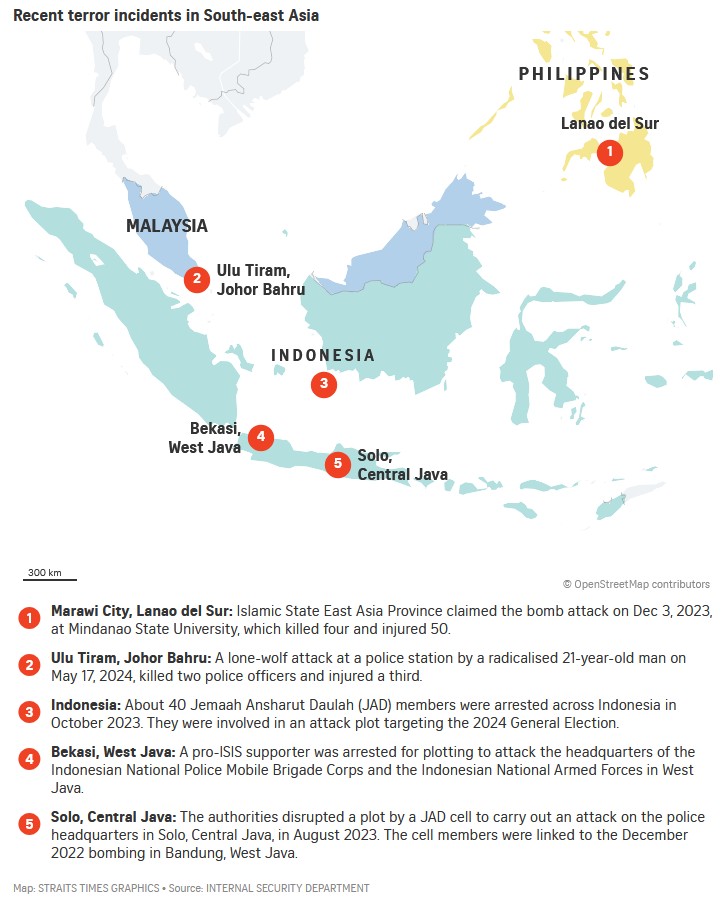July 26, 2024
SINGAPORE – South-east Asia continues to face an active terror threat, primarily from the ISIS militant group, said the Internal Security Department (ISD).
In its annual report on terrorism released on July 25, ISD said the region continues to see ISIS-linked or ISIS-inspired attacks and foiled plots.
On May 17, a radicalised man who was likely motivated by ISIS’ violent ideology attacked a police station in Ulu Tiram, Johor, with a machete, killing two police officers and injuring a third.
ISD said the incident underscores the continued resonance of radical ideologies, such as those extolled by ISIS, among the vulnerable and misguided.
“That this attack was carried out with an easily available bladed weapon also highlights how lone-actor attacks involving simple means remain a serious threat,” ISD added.
The attacker, a 21-year-old Malaysian, was shot dead by a police officer at the scene. His five family members were charged in court with terrorism-related offences.
ISD said Singapore remains a prized target and continues to be featured in ISIS propaganda.
A comment made in March in a forum of a pro-ISIS website suggested that the mujahideen should attack “Chinese outside China” in Muslim and Western countries, specifically mentioning Malaysia and Singapore.
ISD said ISIS supporters in South-east Asia use online communications to connect with like-minded people in the region and incite violence.
The agency pointed to a Philippines-based pro-ISIS media group, Al Fursan Media Foundation, which reportedly collaborated with pro-ISIS groups said to be based in Malaysia.
Turning to Jemaah Islamiyah (JI), ISD said the threat posed by the terror group remains, despite JI’s senior leadership announcing on June 30 that it would be dissolved.
JI’s dissolution is a major accomplishment for the Indonesian authorities, ISD said, noting that the group has been weakened and decimated by waves of pre-emptive strikes and arrests against its leaders and members since 2019.
However, ISD warned that groups within JI that do not agree with their senior leaders may splinter and carry out attacks to demonstrate their commitment to armed jihad.
“Some JI members may also continue to propagate the group’s ultimate ambition of establishing an Islamic caliphate in South-east Asia,” the agency added.
Nonetheless, ISD said in its report that there are strong counter-terrorism efforts in South-east Asia.
In the Philippines, for example, security operations have weakened the Abu Sayyaf group’s operational capabilities, said ISD.
The group’s sub-leader and bomb-maker Mundi Sawadjaan was killed in December 2023 when Philippine security forces foiled his escape attempt.
ISD said Indonesia did not suffer any terror attacks in 2023, and the authorities there arrested close to 150 individuals in counter-terrorism operations that year

Separately, ISD noted that a survey of Singapore residents found that 49 per cent of respondents believed the Republic was a target for terrorist attacks, and 67 per cent agreed that they were generally alert to and on the lookout for suspicious behaviours or items in a public place.
The survey by the then Ministry of Communications and Information, which polled over 2,000 Singaporeans and permanent residents from March to June in 2023, also found that 92 per cent of participants were willing to help other Singaporeans in a national crisis like a terrorist attack.
ISD said public vigilance and preparedness are key to Singapore’s defence against terrorism.
“The authorities will not always be able to neutralise plots before they are actualised, or identify radicalised individuals before they act,” the agency said.
“It is critical that the public remains strongly vigilant to the possibility of a terrorist attack against the country, and that such an attack may be successful.”
Anyone with information on or suspicions about terrorism-related activities, or people who may be radicalised, should contact the ISD counter-terrorism hotline on 1800-2626-473 (1800-2626-ISD).
Signs of possible radicalisation include sharing extremist views on social media platforms, and making remarks that promote ill-will or hatred towards people of other races and religions.



